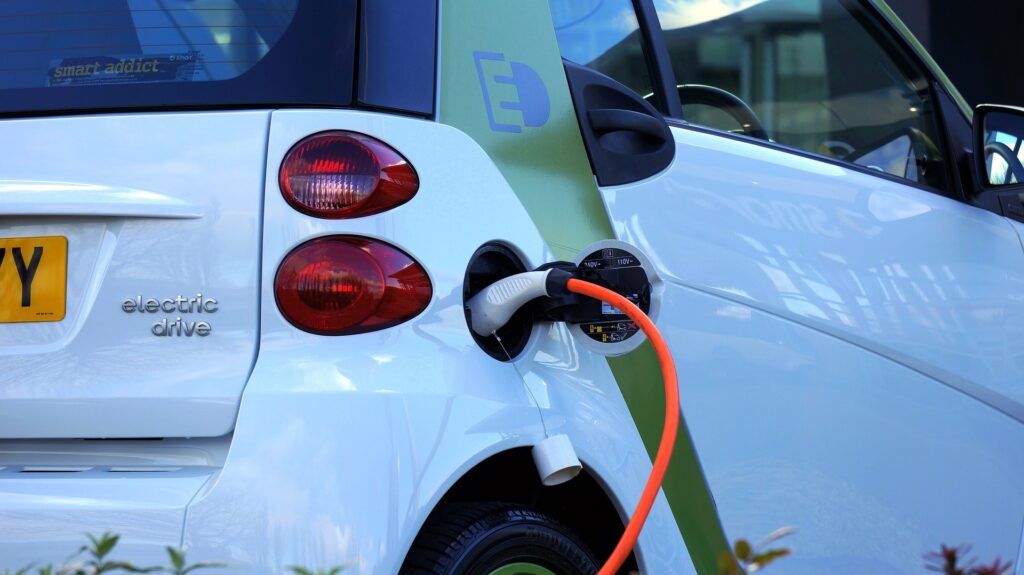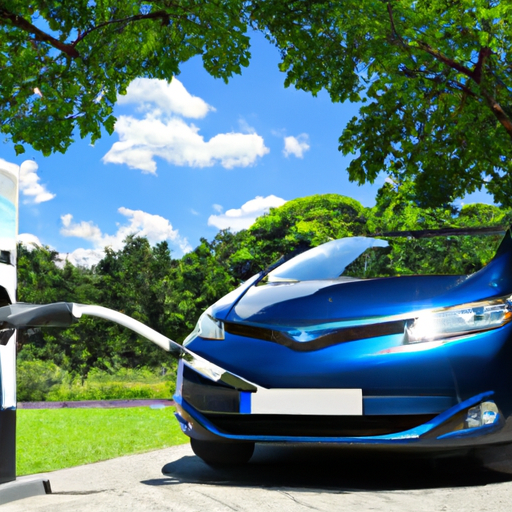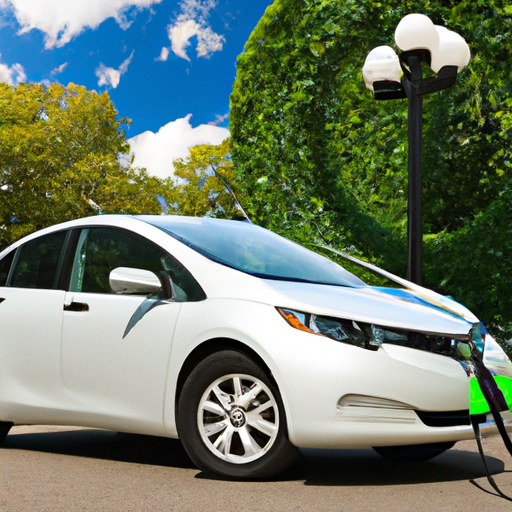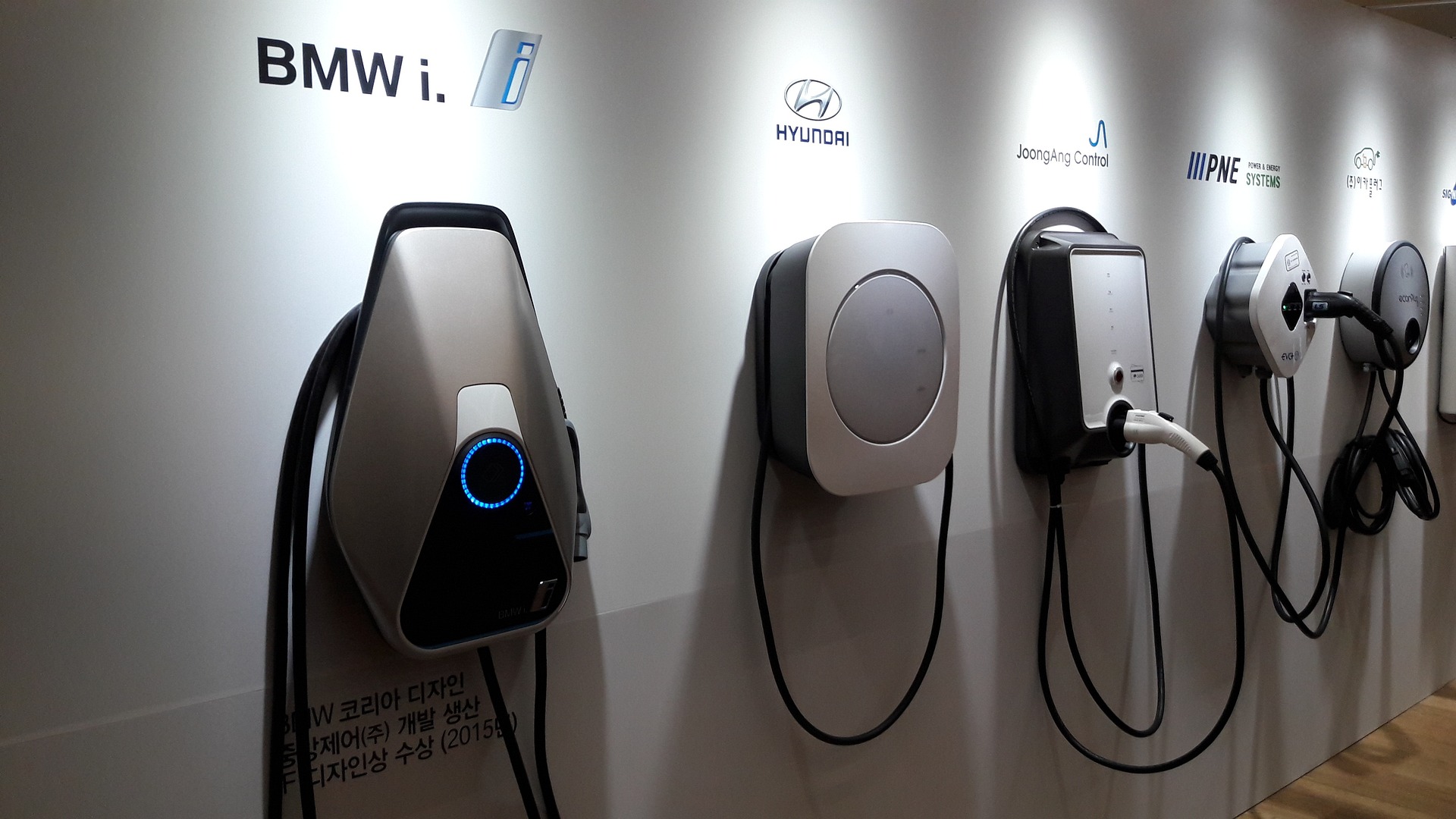Electric cars have emerged as a promising solution to combat the detrimental effects of traditional gasoline-powered vehicles on the environment. With their zero emissions and energy-efficient technology, electric cars are revolutionizing the way we commute. These vehicles run on electricity, reducing our reliance on fossil fuels and subsequently decreasing air pollution and greenhouse gas emissions. In addition to their eco-friendliness, electric cars offer numerous benefits such as lower maintenance costs and a quieter, smoother ride. With an increasing number of electric car models hitting the market, it is clear that these vehicles are paving the way toward a greener future. But how do electric cars help the environment? Read on to find out!

Check Out Our Top Eco Friendly Product Picks On Amazon Here
Reducing Greenhouse Gas Emissions
Electric cars play a crucial role in reducing greenhouse gas emissions, which are a major contributor to climate change. By using electricity as their source of power instead of fossil fuels, electric cars produce zero tailpipe emissions. This means that they do not emit harmful pollutants such as carbon dioxide (CO2), nitrogen oxides (NOx), and volatile organic compounds (VOCs) that are released by traditional gasoline and diesel vehicles. By driving an electric car, you can significantly reduce your carbon footprint and help mitigate the impacts of climate change.
Zero Tailpipe Emissions
One of the key benefits of electric cars is their ability to produce zero tailpipe emissions. As mentioned earlier, these vehicles do not emit any pollutants directly into the atmosphere while they are running. Traditional vehicles, on the other hand, release a large amount of CO2 and other greenhouse gases into the air, contributing to global warming and climate change. By choosing an electric car, you can significantly contribute to the reduction of air pollution and work towards creating a cleaner and healthier environment for everyone.
Lower Lifecycle Emissions
While electric cars offer zero tailpipe emissions, it is essential to consider the lifecycle emissions associated with their production and operation. Although the manufacturing process of electric cars can generate emissions, studies have shown that over the lifetime of an electric vehicle, it still produces fewer emissions compared to conventional cars. This is due to the fact that electric cars are more energy-efficient and rely on electricity sourced from renewable energy.
Reduced Dependence on Fossil Fuels
Another significant advantage of electric cars is their potential to reduce our dependence on fossil fuels. As the world continues to face the challenges of depleting oil reserves and increasing fuel prices, electric cars provide a viable alternative. By utilizing electricity from renewable sources such as solar and wind power, electric vehicles offer a sustainable way to meet our transportation needs. This ultimately reduces the demand for fossil fuels and helps to create a more resilient and secure energy future.
Improving Air Quality
Electric cars not only contribute to reducing greenhouse gas emissions but also play a crucial role in improving air quality. Traditional vehicles emit pollutants such as nitrogen oxides, sulfur oxides, and particulate matter, which can have adverse effects on human health and the environment. By transitioning to electric cars, we can significantly reduce air pollution levels and decrease the negative impact on air quality.
Check Out Our Top Eco Friendly Product Picks On Amazon Here
Reducing Air Pollution
Air pollution is a significant environmental problem that affects the health of millions of people worldwide. With their zero tailpipe emissions, electric cars help to reduce the amount of harmful pollutants released into the air. By choosing to drive an electric car, you are actively participating in the efforts to combat air pollution, creating cleaner and healthier communities for all.
Decreasing Particulate Matter
Particulate matter refers to microscopic solid or liquid particles suspended in the air, which can enter our respiratory system and cause various health problems. Traditional vehicles, particularly those powered by diesel engines, are known to emit high levels of particulate matter. Electric cars, on the other hand, do not produce any tailpipe emissions that contribute to the formation of particulate matter. By making the switch to an electric car, you are contributing to the reduction of particulate matter in the air and protecting your health and the well-being of those around you.
Minimizing Smog Formation
Smog, a common phenomenon in many urban areas, occurs when certain pollutants, such as nitrogen oxides and volatile organic compounds, react with sunlight and form a mixture of harmful gases and particulate matter. Electric cars, with their zero tailpipe emissions, can help minimize the formation of smog. By driving electric, you can play a vital role in reducing smog and creating cleaner, clearer skies for everyone to enjoy.
Conserving Energy Resources
Electric cars are known for their higher energy efficiency compared to traditional combustion engine vehicles. This efficiency helps in conserving energy resources, which are finite and increasingly in high demand. By utilizing electric motors and regenerative braking systems, electric cars can convert a higher percentage of stored energy into propulsion, reducing energy waste and maximizing energy conservation.
Higher Energy Efficiency
Electric cars are more energy-efficient than their gasoline or diesel counterparts. While internal combustion engines waste a significant amount of energy in the form of heat, electric cars have higher energy conversion rates. This means that a larger proportion of electrical energy stored in the car’s batteries is directly used to power the wheels, resulting in increased efficiency.

Reduced Energy Waste
Electric cars also minimize energy waste through regenerative braking systems. This technology allows the car to convert kinetic energy into electrical energy while braking, which can be stored in the vehicle’s battery for later use. By capturing and utilizing this otherwise wasted energy, electric cars further optimize their energy efficiency and contribute to conserving valuable energy resources.
Enhancing Energy Security
Electric cars contribute to enhancing energy security by diversifying our sources of energy. By reducing our dependence on fossil fuels for transportation, we can rely more on renewable sources of energy such as solar and wind power. This diversification helps to create a more resilient and secure energy system, reducing the vulnerability to geopolitical tensions and fluctuations in fuel prices.
Protecting Natural Resources
Electric cars offer several benefits when it comes to protecting natural resources and minimizing our impact on the environment. From reducing water consumption to preserving ecosystems and minimizing land disturbance, electric cars contribute to ensuring the sustainable use of our precious natural resources.
Reduced Water Consumption
Traditional vehicle production, particularly the manufacturing of combustion engines, is water-intensive. Electric cars, in comparison, have relatively lower water consumption during manufacturing. By choosing electric cars, you can contribute to conserving water resources and reducing the strain on freshwater ecosystems.
Preserving Ecosystems
The extraction and refinement of fossil fuels necessary for traditional vehicles often lead to significant environmental degradation and habitat destruction. Electric cars, which rely on electricity instead of fossil fuels, contribute to preserving ecosystems by reducing the demand for such extraction activities. By supporting the use of electric vehicles, you are making a positive impact on the protection and preservation of biodiversity and natural habitats.

Minimizing Land Disturbance
The production and utilization of electric vehicles generally require less land compared to conventional vehicles. With electric cars, there is no need for extensive drilling and exploration activities associated with extracting fossil fuels. Moreover, electric cars have the potential to utilize existing infrastructure, such as charging stations, without requiring substantial land development. By driving electric, you are promoting the minimization of land disturbance and contributing to the preservation of natural landscapes.
Decreasing Noise Pollution
In addition to their environmental benefits, electric cars also have advantages when it comes to reducing noise pollution. Electric vehicles operate much quieter than their internal combustion engine counterparts, providing a more peaceful and pleasant urban environment. By driving electric, you can contribute to reducing noise levels and promoting quieter communities.
Noise Reduction Benefits
Noise pollution is a significant issue, especially in densely populated areas. Traditional vehicles with internal combustion engines can contribute to noise levels that are detrimental to our well-being. Electric cars, being significantly quieter, help to reduce the overall noise pollution in urban areas. By choosing electric, you can contribute to a more peaceful and harmonious living environment, benefiting both yourself and those around you.
Promoting Renewable Energy Integration
Electric cars can play a vital role in promoting the integration and adoption of renewable energy technologies. By increasing support for renewable technologies, encouraging grid stability, and enabling energy storage, electric cars can accelerate the transition towards a cleaner and more sustainable energy system.
Increasing Support for Renewable Technologies
Electric vehicles provide a significant market for renewable energy technologies. With the rise in demand for electric cars, there is a corresponding need for charging infrastructure and renewable energy generation capacity. By driving an electric car, you are indirectly supporting the growth of renewable energy technologies, contributing to their widespread adoption and reducing our reliance on fossil fuels.

Encouraging Grid Stability
The integration of a large number of electric vehicles into the electricity grid can present both challenges and opportunities. However, with proper planning and implementation, electric cars can help improve grid stability. For instance, electric vehicles can provide grid services by participating in demand response programs, where they can adjust their charging schedules based on the needs of the grid. This flexibility can assist in balancing electricity supply and demand and promoting a more robust and stable grid infrastructure.
Enabling Energy Storage
Electric car batteries have the potential to serve as energy storage systems that can be tapped into during times of high electricity demand or renewable energy intermittency. By allowing bidirectional energy flow between the electric vehicle battery and the grid, electric cars can help store excess renewable energy and release it back into the grid when needed. This feature enables a better integration of renewable energy sources and contributes to the overall reliability and resilience of the electricity system.
Driving Technological Innovations
Electric cars drive technological innovations in various sectors, ranging from battery technology advancements to electric vehicle infrastructure and software developments. These innovations not only improve the performance and efficiency of electric cars but also have wider implications for the advancement of sustainable transportation.
Fostering Battery Technology Advancements
The development of electric car battery technology has seen significant progress in recent years. With ongoing research and investment, batteries are becoming more energy-dense, longer-lasting, and cost-effective. These advancements are not only beneficial for electric cars but also have implications for other sectors, such as renewable energy storage and portable electronic devices. By driving an electric car, you are contributing to fostering further battery technology advancements and driving innovation in the energy storage industry.
Accelerating Electric Vehicle Infrastructure
The increasing popularity of electric cars has led to the expansion of electric vehicle infrastructure. More charging stations are being installed across countries, making it easier for electric car owners to charge their vehicles conveniently. This growth in infrastructure not only benefits electric car owners but also encourages the adoption of electric vehicles by reducing concerns about range anxiety. By driving an electric car, you are contributing to the acceleration of electric vehicle infrastructure, making electric transportation more accessible and convenient for all.

Spurring Software Developments
Electric cars rely on sophisticated software systems to manage and control various aspects of their operation, including battery management, energy efficiency optimization, and regenerative braking. As electric vehicle technology advances, so does the need for innovative software solutions that enhance the performance and functionality of electric cars. By choosing an electric car, you are supporting the development of software technologies that have broader applications beyond transportation, contributing to the growth of the software industry and driving technological progress.
Creating Economic Opportunities
The transition to electric cars presents numerous economic opportunities, ranging from job creation in the green sector to boosting local economies and stimulating innovation and investment. By embracing electric cars, we can unlock the potential for economic growth while also promoting sustainability and environmental stewardship.
Developing Jobs in the Green Sector
The shift towards electric cars and renewable energy technologies creates new job opportunities in the green sector. The manufacturing, installation, and maintenance of electric vehicles and related infrastructure require a skilled workforce. By supporting the adoption of electric cars, we can drive job creation and provide employment opportunities in industries that contribute to a more sustainable future.
Boosting Local Economy
The widespread adoption of electric cars can boost local economies in various ways. The development of charging infrastructure, for example, requires investment and creates revenue streams for local businesses. Moreover, by reducing our dependence on imported fossil fuels, we can redirect our spending towards local energy sources and contribute to regional economic development. By choosing electric cars, you can play a role in boosting your local economy and supporting businesses within your community.
Stimulating Innovation and Investment
The transition to electric cars and the broader clean transportation sector stimulates innovation and attracts investment. As the demand for electric vehicles grows, companies invest in research and development, paving the way for new technologies and advancements. This innovation translates into economic growth and fosters a culture of entrepreneurship and technological leadership. By embracing electric cars, you are contributing to stimulating innovation and investment, creating a positive environment for economic opportunities.
Reducing Health Risks
Electric cars offer several health benefits by minimizing respiratory problems, improving human health, and mitigating the impacts of climate change. By reducing air pollution and dependence on fossil fuels, electric cars contribute to safeguarding our well-being and creating a healthier future for everyone.
Improving Human Health
Air pollution, primarily caused by the emissions from traditional vehicles, is a major threat to human health. Long-term exposure to pollutants can lead to various respiratory and cardiovascular problems, including asthma, lung cancer, and heart disease. By driving electric cars, which emit zero tailpipe emissions, we can contribute to improving human health and reducing the occurrence of these health conditions.
Minimizing Respiratory Problems
Air pollution, particularly the presence of fine particulate matter, affects respiratory health and can exacerbate existing respiratory conditions. Electric cars, with their zero tailpipe emissions, help to minimize the release of harmful pollutants that can contribute to respiratory disorders. By choosing electric cars, you are making a positive impact on respiratory health, both for yourself and for others who may be vulnerable to the adverse effects of air pollution.
Mitigating Climate Change Impact
Electric cars play a crucial role in mitigating the impacts of climate change, which pose significant risks to human health and well-being. By reducing greenhouse gas emissions and promoting the use of renewable energy, electric cars help to address the root causes of climate change. This, in turn, helps to minimize the adverse effects such as extreme weather events, rising sea levels, and disruptions to ecosystems. By driving an electric car, you are actively contributing to the global effort to combat climate change and create a more sustainable future for generations to come.
Addressing Climate Change
Electric cars contribute to addressing climate change by actively supporting emissions reduction targets, international agreements, and alleviating the effects of global warming. By embracing electric transportation, we can play a significant role in combatting one of the most pressing challenges of our time.
Contributing to Emissions Reduction Targets
Countries around the world have committed to reducing their greenhouse gas emissions to mitigate the impacts of climate change. Electric cars, with their zero tailpipe emissions, play a crucial role in helping nations achieve these emissions reduction targets. By driving electric, you are contributing to the global effort to combat climate change and create a more sustainable future.
Supporting International Agreements
International agreements, such as the Paris Agreement, aim to limit global warming and its impacts by reducing greenhouse gas emissions. Electric cars align with these agreements and support the collective efforts of nations to address climate change. By choosing an electric car, you are demonstrating your commitment to sustainability and playing your part in supporting these crucial international agreements.
Alleviating Global Warming Effects
The impacts of global warming, including rising temperatures, changing weather patterns, and sea-level rise, pose significant challenges for societies worldwide. By reducing greenhouse gas emissions, electric cars contribute to mitigating these effects and alleviating the long-term consequences of climate change. By driving an electric car, you are actively working towards creating a more sustainable and resilient planet for future generations.
In conclusion, electric cars offer a wide range of environmental, economic, and health benefits. From reducing greenhouse gas emissions and air pollution to conserving energy and protecting natural resources, electric cars have the potential to transform our transportation system and create a more sustainable future. By embracing electric transportation, we can drive innovation, stimulate economic growth, and address the challenges of climate change and air pollution. The choice to drive an electric car is not only a personal decision but also a valuable contribution to safeguarding our planet and ensuring a healthier and better future for all.




